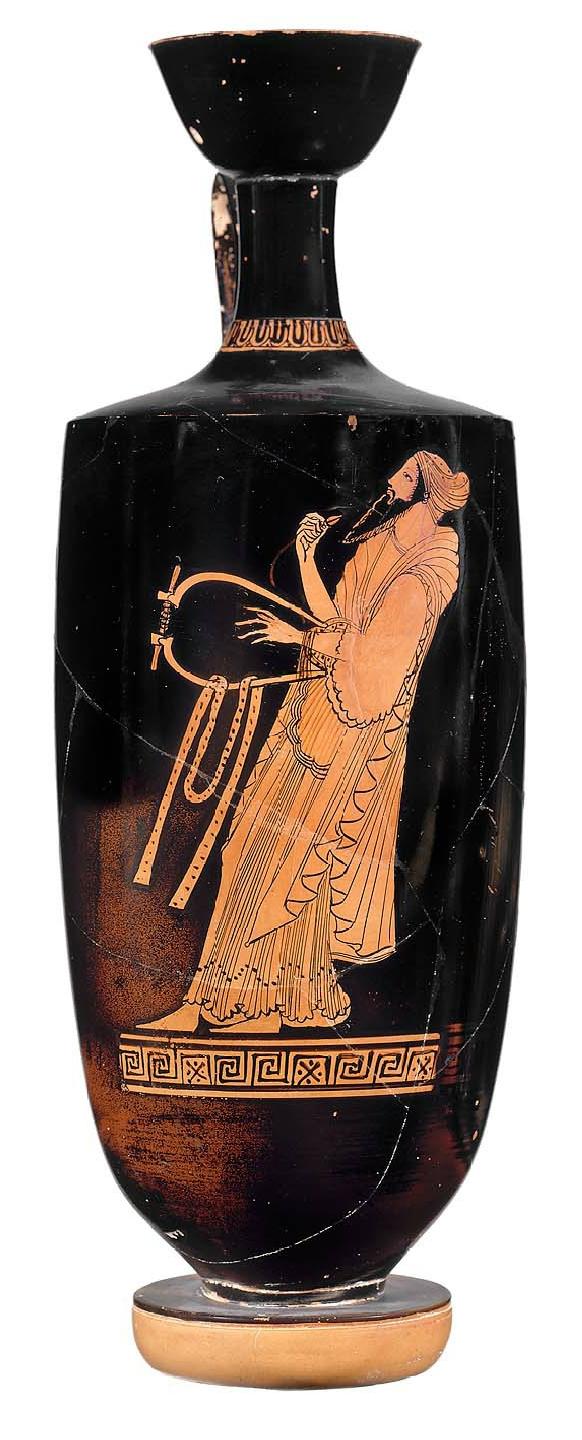- Agathon
Agathon ( _el. Ἀγάθων) (ca. 448–400 BC) was an Athenian tragic poet and friend of
Euripides andPlato . He is best known for being mentioned byAristophanes in his "Thesmophoriazusae " and for his appearance in Plato's "Symposium," which describes the banquet given to celebrate his obtaining a prize for his first tragedy at theLenaia in (416).Citation
last = Whiston
first = Robert
author-link =
contribution = Agathon (2)
editor-last = Smith
editor-first = William
title =Dictionary of Greek and Roman Biography and Mythology
volume = 1
pages = 65-66
publisher =
place = Boston
year = 1867
contribution-url = http://www.ancientlibrary.com/smith-bio/0074.html ] He was the long-term (25-30 years) beloved of Pausanias, who also appears in the "Symposium" and "Protagoras". [Pierre Leveque, "Agathon" (Paris: Societe d'Edition Les Belles Lettres, 1955), pp. 163-4. ] Together with Pausanias he later moved to the court of Archelaus, king ofMacedon , who was recruiting playwrights; it is here that he probably died around 402 BC. He introduced certain innovations into the Greek theater; for exampleAristotle ("Poetica," 9) tells us that the plot of his "Antho" was original and not, as was usual at the time, borrowed from mythological subjects.Agathon is portrayed by Plato as a handsome young man, well dressed, of polished manners, courted by the fashion, wealth and wisdom of
Athens , and dispensing hospitality with ease and refinement. Theepideictic speech in praise of love which he recites in the "Symposium" is full of the sort of artificial rhetorical expressions which might be expected from a former pupil ofGorgias . Aristotle tells us that he was the first to introduce into the drama arbitrary choral songs, unrelated to the subject, and that he wrote pieces with fictitious names which appear to have been halfway between the idyl and comedy. His intimacy with Aristophanes doubtless saved him from many well-deserved strictures, though in the "Thesmophoriazusae" the comic poet burlesques his flowery style and represents him as a delicate and effeminate youth; it may be only for the sake of punning on his name (Áγαθός = "good") that he makes Dionysus call him a noble poet.Agathon was also a friend of
Euripides , another recruit to the court of Archelaus of Macedon. He seems, however, to have had all the faults, and little of the genius, of his famous contemporary. He tended to excess, attempting to surprise his spectators with unexpected developments and strange, improbabledénouement s. Add to this his fondness forepigram , antithesis and other rhetorical embellishments, after the fashion of Gorgias, and it's no wonder that whatever he possessed of ability was smothered beneath his mannerisms. All the same, he appears to have been proud of his quirks, considering them essential to his verse; when asked to purge his work of such blemishes, he replied, "You do not see that that would be to purge Agathon's play of Agathon." His poetry was full of tropes, inflection and metaphor; it had the glitter of sparkling ideas flowing smoothly along, with harmonious diction and deft construction, but it lacked real vigor of thought and expression. With him begins the decline of tragic art in its higher sense.Physical Appearance
thumb| This fifth-century depiction of the poet Anacreon shows the kind of clothing Agathon might have worn."Museum of Fine Arts, Boston"Agathon's extraordinary physical beauty is brought up repeatedly in the sources; the historian W. Rhys Roberts observes that "ὁ καλός Ἀγάθων" has become almost a stereotyped phrase." [W. Rhys Roberts, "Aristophanes and Agathon," "The Journal of Hellenic Studies," Vol. 20 (1900), p 50.] Our most detailed description of Agathon can be found in Aristophanes' comedy, the "Thesmophoriazousae," in which Agathon appears as a pale, cleanshaven young man, dressed in women's clothes. Regrettably, it is hard to determine how much of Aristophanes' portrayal is fact and how much mere comic invention.After a close reading of the "Thesmophoriazousae," the historian Jane McIntosh Snyder observed that Agathon's costume was almost identical to that of the famous lyric poet
Anacreon , as he is portrayed in early 5th-century vase-paintings. Snyder theorizes that Agathon might have made a deliberate effort to mimic the sumptuous attire of his famous fellow-poet, although by Agathon's time, such clothing, especially the "κεκρύφαλος" (an elaborate covering for the hair) had long fallen out of fashion for men. According to this interpretation, Agathon is mocked in the "Thesmophoriazousae" not only for his notorious effeminacy, but also for the pretentiousness of his dress: "he seems to think of himself, in all his elegant finery, as a rival to the old Ionian poets, perhaps even to Anacreon himself." [Jane McIntosh Snyder, "Aristophanes' Agathon as Anacreon," "Hermes," 102 (1974) p 246.]Plato's Epigram
Agathon has been thought to be the subject of "Lovers' Lips," attributed to the philosopher
Plato :::::Kissing Agathon, I had my soul upon my lips; for it rose, poor wretch, as though to cross over.
A looser translation reads:
::::Kissing Agathon, I found my soul at my lips. Poor thing! It went there, hoping--to slip across.
Although the authenticity of this epigram was accepted for many centuries, it was probably "not" composed for Agathon the tragedian; nor was it composed by Plato. Stylistic evidence suggests that the poem (with most of Plato's other alleged epigrams) was actually written some time after Plato had died: for its form is that of the Hellenistic erotic epigram, which did not become popular until after 300 B.C. According to 20th-century scholar Walther Ludwig, the poems were spuriously inserted into an early biography of Plato--sometime between 250 B.C. and 100 B.C.--and adopted by later writers from this source. [Walther Ludwig, "Plato's Love Epigrams," Greek, Roman and Byzantine Studies, 4:2 (1963: Spring) pp 59-82.]
References
Notes
Other sources
*"The Drama: Its History, Literature and Influence on Civilization", volume 1, by
Alfred Bates . (London :Historical Publishing Company , 1906)
*"Thesmoph." 59, 106, "Eccles." 100 (Aristophanes )
*"Lovers' Lips" by Plato in theProject Gutenberg eText "Select Epigrams from the Greek Anthology" byJ. W. Mackail . [http://www.gutenberg.org/dirs/etext00/8efgm10.txt]
Wikimedia Foundation. 2010.

